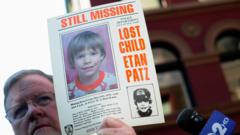In a significant legal development, a U.S. appeals court has mandated a new trial for Pedro Hernandez, who was convicted in the 1979 murder of six-year-old Etan Patz. The court highlighted flaws in jury instructions during Hernandez's original trial, potentially impacting his conviction.
New Trial Ordered for Man Convicted in Etan Patz Case

New Trial Ordered for Man Convicted in Etan Patz Case
A U.S. appeals court has ruled Pedro Hernandez deserves a new trial in the notorious case of missing child Etan Patz.
In a groundbreaking ruling, a U.S. appeals court has determined that Pedro Hernandez, the man convicted in the infamous 1979 murder of six-year-old Etan Patz, should either receive a new trial or be released. The case, which has become one of the most notable missing children's cases in American history, left a significant mark on New York City and generated extensive public interest following Patz's disappearance while walking to a school bus stop in Manhattan.
Hernandez, a convenience store owner, was found guilty in 2017 after a previous trial in 2015 resulted in a hung jury. His confession, in which he claimed to have lured Patz into a basement before killing him, played a central role in securing the conviction. However, Hernandez argued during his appeal that his jury received faulty instructions, which violated Supreme Court precedent and unjustly influenced their verdict.
The Second Circuit Court of Appeals concurred with Hernandez's appeal, noting that the trial court made an error that significantly deviated from federal law. "The state trial court contradicted clearly established federal law and that this error was not harmless," the court stated in its decision.
The Patz case left investigators grappling with a haunting mystery for decades, as despite an extensive search—and even featuring Etan's face on milk cartons nationwide—the child was never found. As part of their investigation, authorities kicked off a broad campaign, shining a light on the issue of missing children in the U.S.
In 2012, law enforcement began interrogating Hernandez, who ultimately confessed to the crime after an extended period of questioning. Although he later provided recorded confessions after being read his Miranda rights, the appeals court stressed that Hernandez had a documented history of mental illness and low IQ, which might have influenced the reliability of his initial confession.
The appeals court decision highlighted that jurors raised concerns about whether they should disregard Hernandez's later confessions if they deemed the first one as involuntary. The presiding judge's response to the jury, instructing them that they could not disregard his admissions, raised significant legal concerns.
Hernandez faced charges of felony murder and kidnapping as a result of the trial, although he was acquitted on the count of intentional murder. His attorney, Harvey Fishbein, expressed gratitude for the appeals court's ruling, urging the Manhattan District Attorney's Office to drop the charges and refocus their efforts on finding the actual culprits responsible for Etan Patz's disappearance.


















